The Best 10 Alternatives to Illumio (+ Pricing & Reviews)
Twingate Team
•
Jul 27, 2024

Illumio specializes in Zero Trust Segmentation to contain breaches and prevent ransomware from spreading across hybrid attack surfaces. While Illumio offers robust solutions, it might not be the choice for everyone. This article explores the benefits and considerations of using Illumio for cybersecurity.
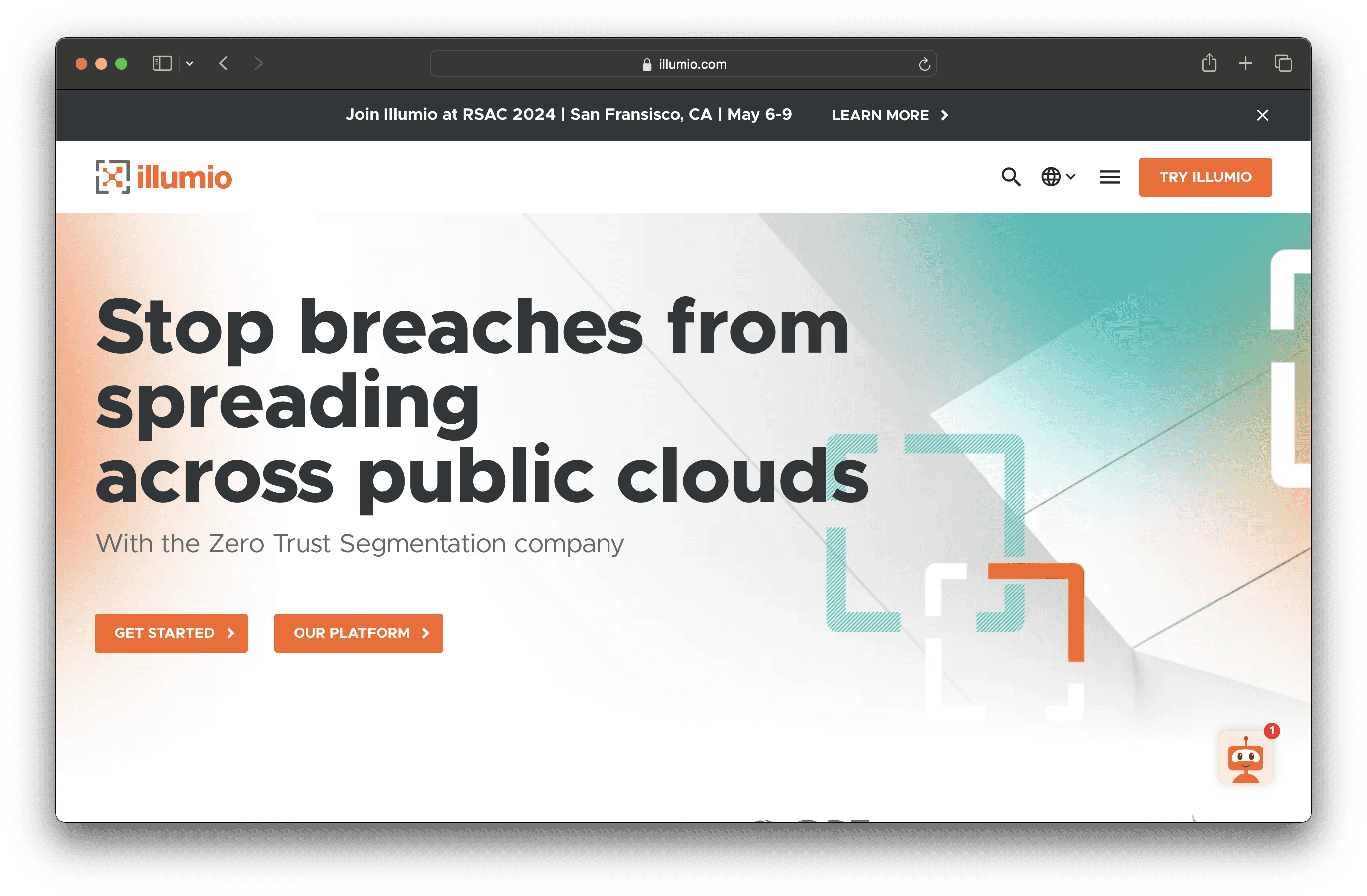
10 Alternatives to Illumio
1. CrowdStrike Falcon
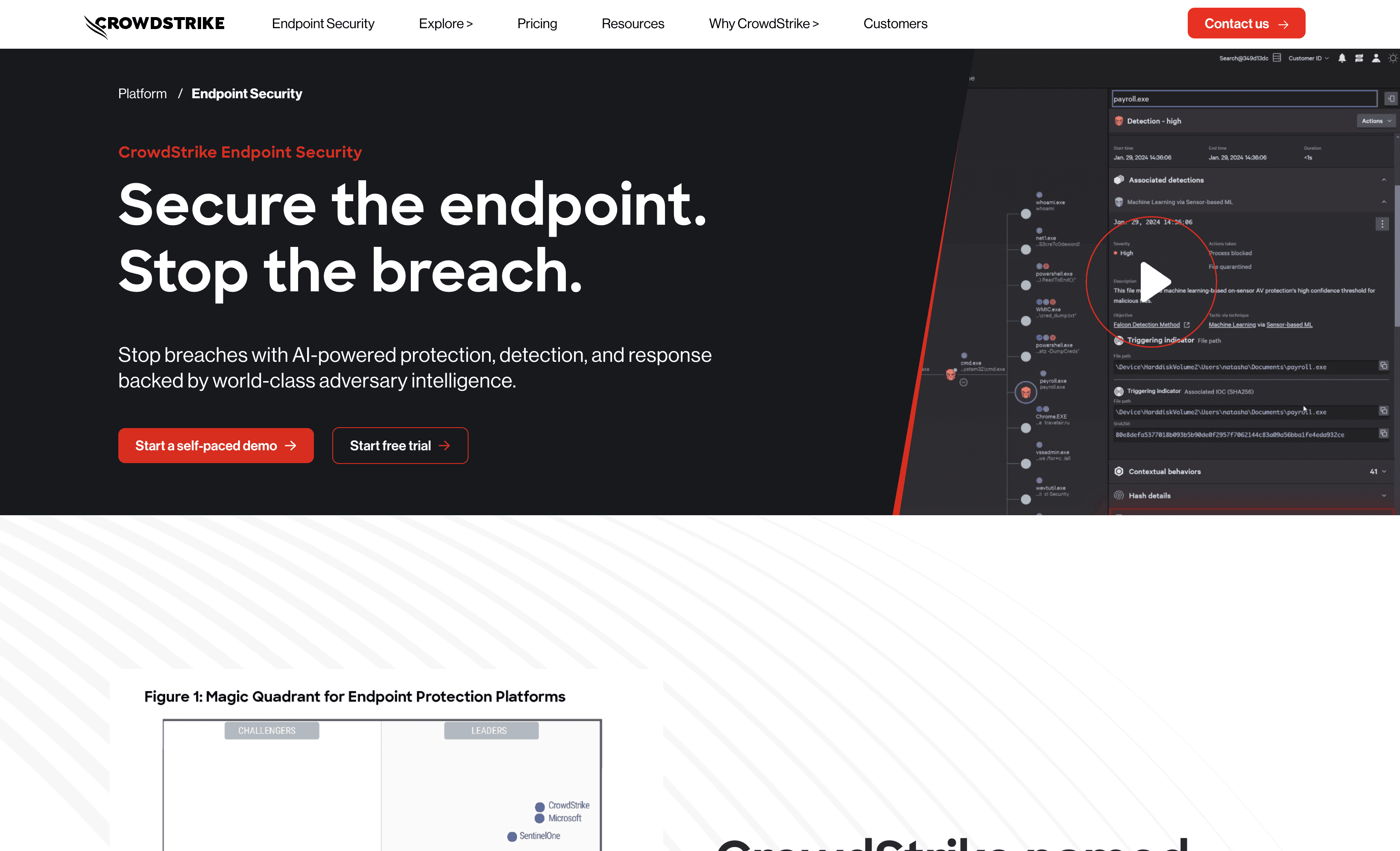
CrowdStrike Falcon is an endpoint security solution designed to stop breaches with AI-powered protection, detection, and response. It offers comprehensive coverage for various operating systems and integrates advanced threat intelligence to detect and block malicious behaviors early in the kill chain. Falcon is known for its ease of deployment and user-friendly interface.
CrowdStrike Falcon Pricing
Falcon Pro: $99.99/device per year
Falcon Enterprise: $184.99/device per year
Falcon Elite: Contact sales for pricing
Falcon Go: $59.99/device per year
CrowdStrike Falcon Reviews
CrowdStrike Falcon has an overall rating of 4.7 out of 5 stars based on 278 reviews. Users praise its ease of use and excellent customer support. Check out more of our reviews here!
Pros and Cons of CrowdStrike Falcon
Pros:
AI-powered protection ensures real-time threat detection and response, minimizing the risk of breaches.
Comprehensive coverage across various operating systems, including legacy systems, ensures no endpoint is left unprotected.
Unified visibility across cloud, endpoints, and identities helps detect and prevent cross-domain attacks effectively.
Cons:
The platform's advanced features can be complex, requiring a steep learning curve for new users.
High cost may be prohibitive for smaller organizations, making it less accessible to all.
Resource-intensive nature of the platform may require significant infrastructure for optimal performance.
2. UnderDefense
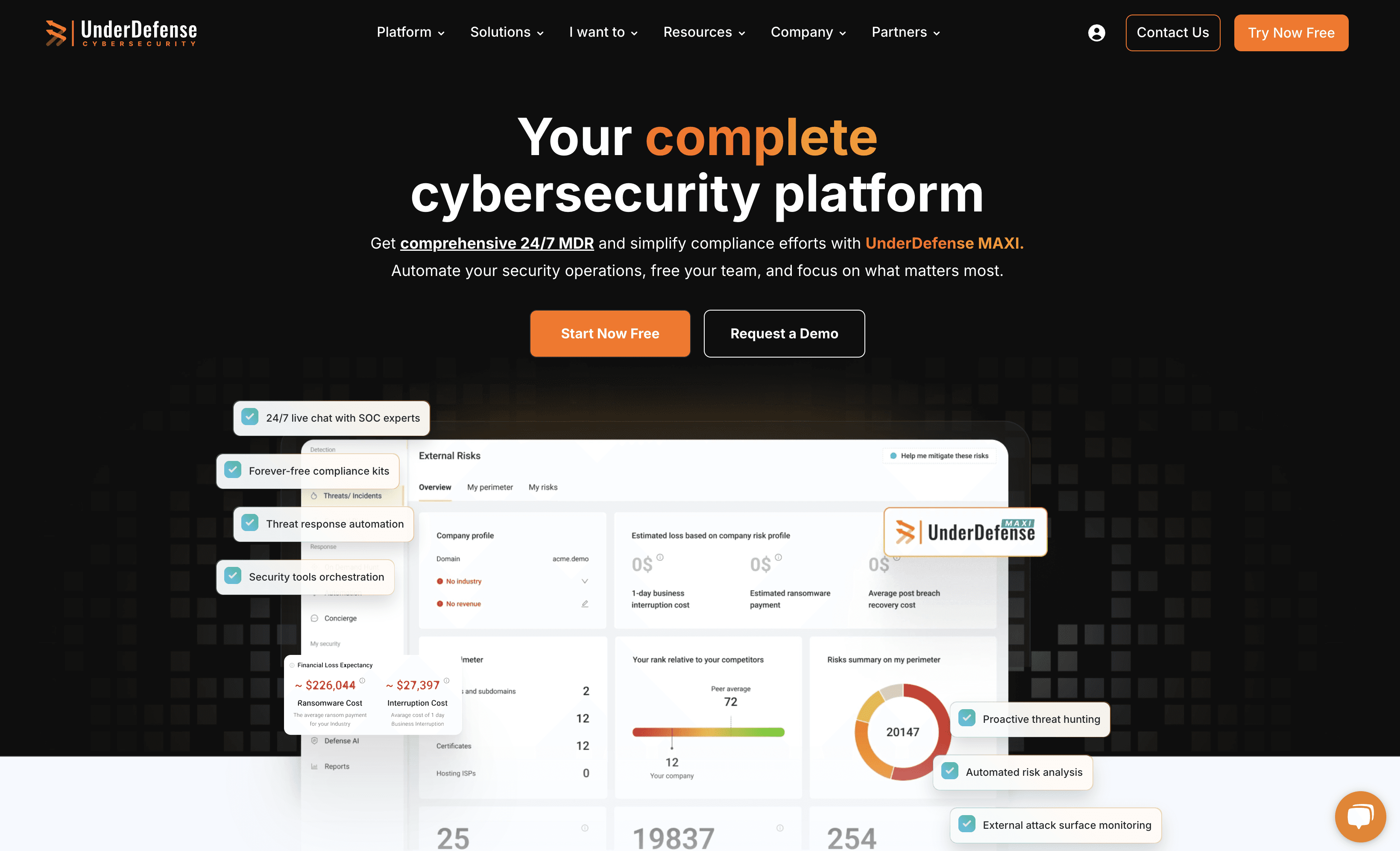
UnderDefense is a comprehensive cybersecurity platform offering 24/7 Managed Detection and Response (MDR), threat response automation, and security tools orchestration. Designed for ease of use and scalability, it helps businesses automate security operations, allowing teams to focus on critical tasks while ensuring robust protection.
UnderDefense Pricing
UnderDefense's pricing is not public. Contact their support for more info.
UnderDefense Reviews
UnderDefense has an overall rating of 5.0 out of 5 stars based on 4 reviews. Users praise its tailored approach and professional support. Check out more of our reviews here!
Pros and Cons ofUnderDefense
Pros:
24/7 live chat with SOC experts ensures immediate support and guidance, enhancing security response times.
Threat response automation reduces manual intervention, allowing security teams to focus on critical tasks.
Seamless integration with existing security tools minimizes disruption and leverages current investments.
Cons:
Some users find the recommendations in reports too general, requiring extra effort to implement.
High cost may be prohibitive for smaller organizations, limiting accessibility.
Users suggest more frequent updates during penetration tests to stay ahead of emerging threats.
3. Barracuda CloudGen Firewall
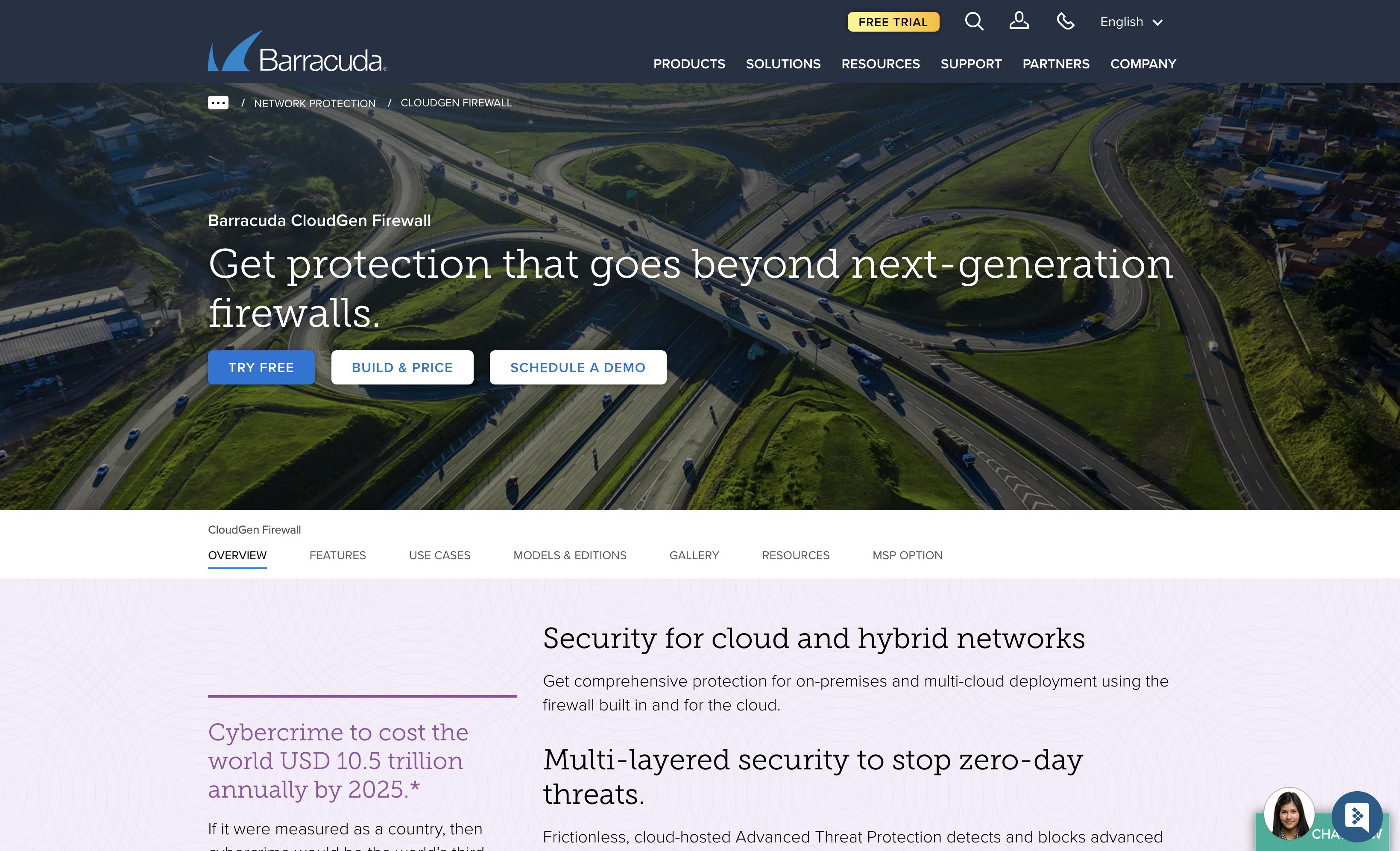
Barracuda CloudGen Firewall is a network security solution designed to protect against a wide range of threats, including zero-day attacks and ransomware. It offers advanced threat protection, built-in SD-WAN capabilities, and seamless cloud integration, making it a versatile choice for businesses seeking robust and scalable security.
Barracuda CloudGen Firewall Pricing
Barracuda CloudGen Firewall's pricing is not public. Contact their support for more info.
Barracuda CloudGen Firewall Reviews
Barracuda CloudGen Firewall has an overall rating of 4.5 out of 5 stars based on 42 reviews. Users appreciate its ease of use and reliable SSL VPN feature. Check out more of our reviews here!
Pros and Cons of Barracuda CloudGen Firewall
Pros:
Comprehensive Protection: Offers robust security for both on-premises and multi-cloud environments, ensuring all assets are protected.
Ease of Deployment: Automated deployment and configuration make it simple to set up, especially in cloud environments.
Centralized Management: The Barracuda Firewall Control Center allows for streamlined management from a single interface.
Cons:
Complexity: Advanced features and multi-layered security can be challenging for new users to master.
Resource Intensive: Full-emulation sandboxing for threat detection may require significant system resources.
Cost: High-end features and capabilities might be expensive, potentially limiting accessibility for smaller organizations.
4. Orca Security
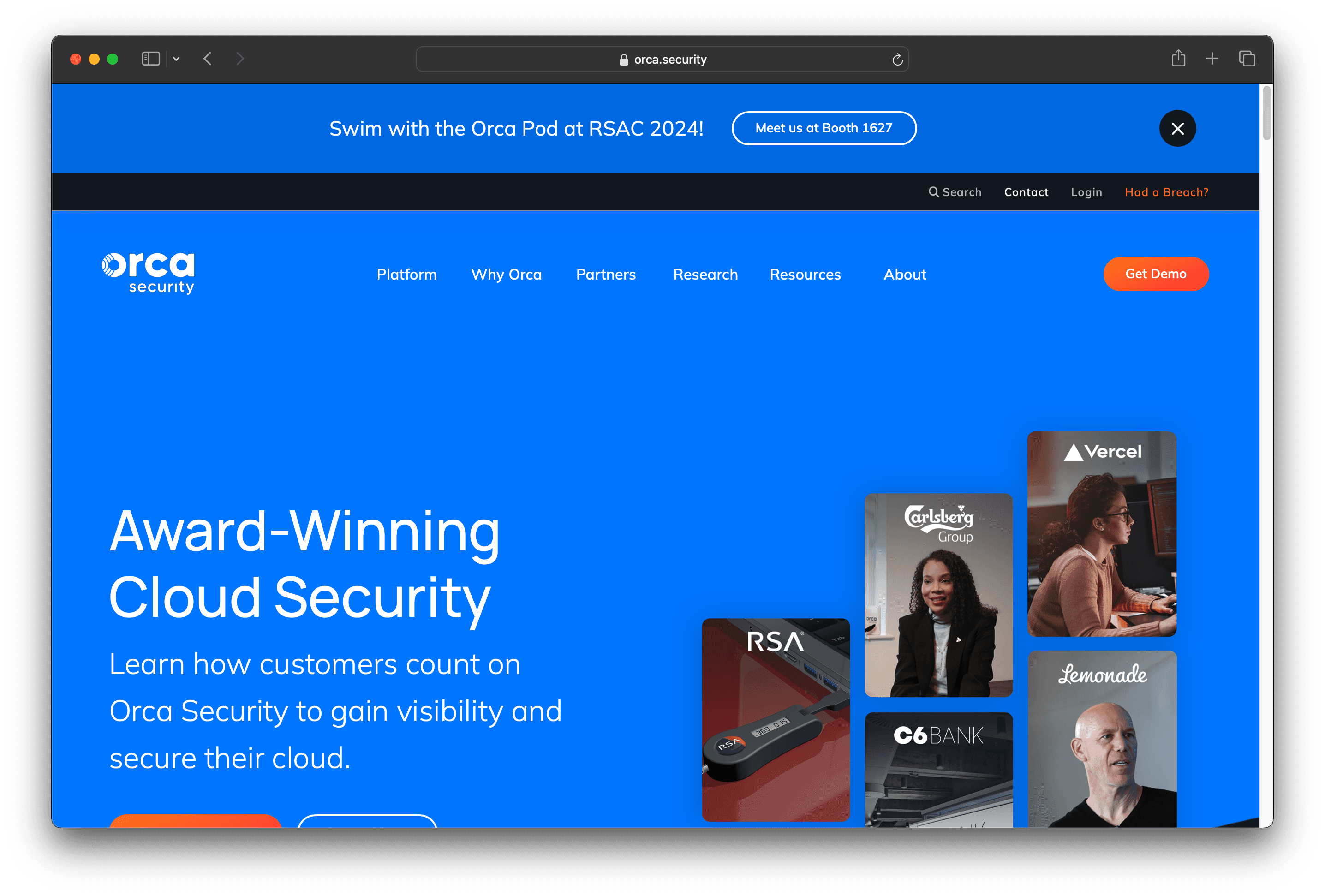
Orca Security is a cloud security platform offering agentless deployment and comprehensive coverage for multi-cloud environments. It leverages AI-driven insights to detect vulnerabilities and ensure compliance, making it easy to secure cloud-native applications and infrastructure without manual updates or complex integrations.
Orca Security Pricing
Orca Security's pricing is not public. Contact their support for more info.
Orca Security Reviews
Orca Security has an overall rating of 4.6 out of 5 stars based on 167 reviews. Users appreciate its comprehensive visibility and excellent support. Check out more of our reviews here!
Pros and Cons of Orca Security
Pros:
Agentless Cloud Security: Orca's patented SideScanning technology eliminates the need for agents, reducing gaps in coverage and operational costs.
Easy Onboarding: Quick and efficient onboarding process that automatically detects and monitors new cloud assets.
Comprehensive Coverage: Full-stack visibility and coverage for all cloud assets, including VMs, containers, storage buckets, databases, and serverless applications.
Cons:
Complexity for Small Teams: The comprehensive nature of the platform might be overwhelming for smaller teams or organizations with limited security expertise.
Cost: Advanced security solutions like Orca Security can be expensive, which might be a barrier for smaller organizations or startups.
Learning Curve: Integrating and fully utilizing all features of a robust platform like Orca Security may require significant time and training.
5. Tenable
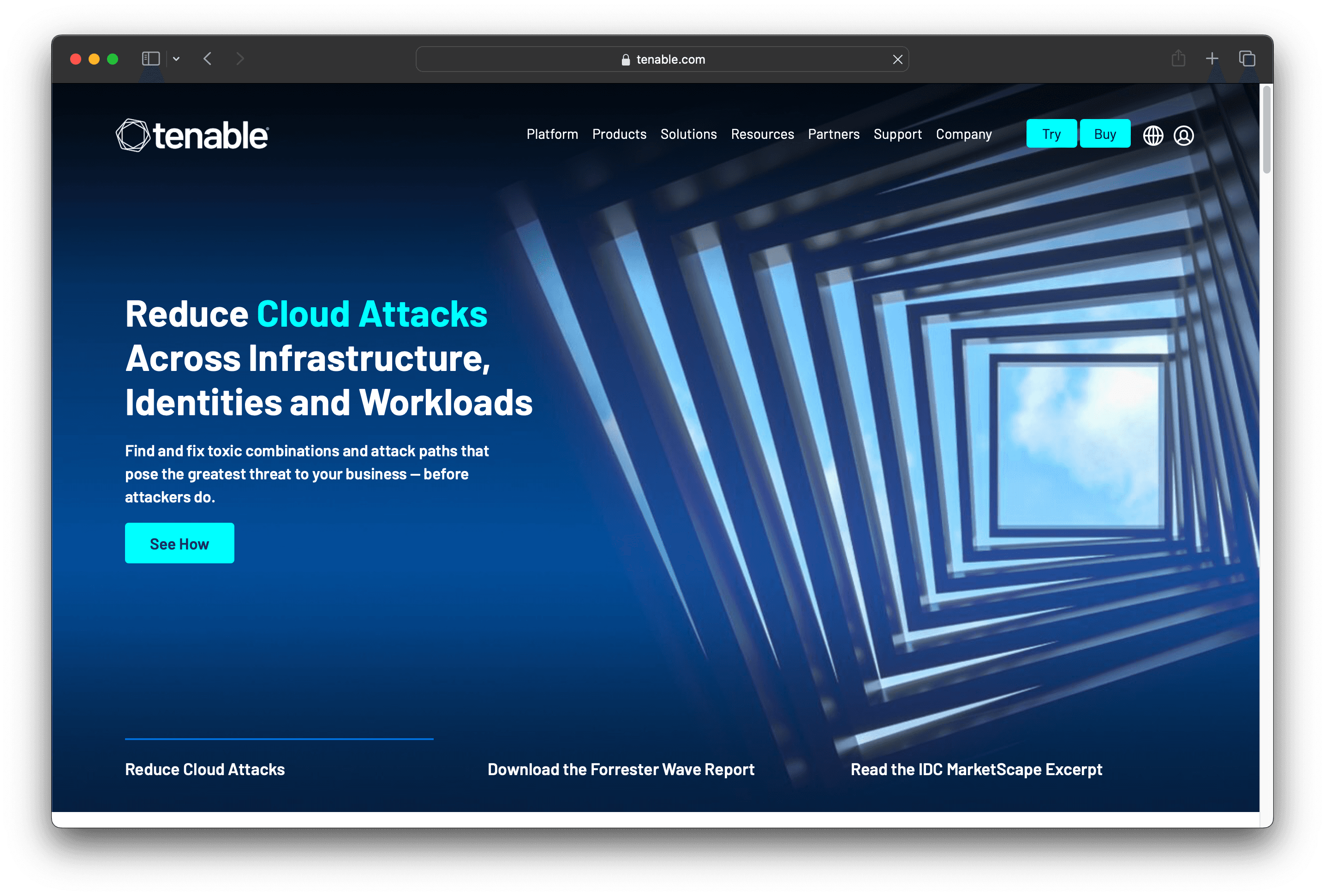
Tenable is a cybersecurity platform specializing in exposure management and vulnerability assessment. It offers comprehensive solutions to identify, assess, and manage security risks across various environments. Designed for ease of use and scalability, Tenable helps organizations maintain robust security postures with minimal manual intervention.
Tenable Pricing
Tenable Nessus Professional: 1 year - $3,990
Tenable Nessus Professional: 2 years - $7,780.50
Tenable Nessus Professional: 3 years - $11,371.50
Advanced support: $400
Nessus Fundamentals training: $275
Tenable Reviews
Tenable has an overall rating of 4.5 out of 5 stars based on 109 reviews. Users praise its intuitive interface and comprehensive asset discovery. Check out more of our reviews here!
Pros and Cons of Tenable
Pros:
Comprehensive Security Solutions: Tenable offers a wide range of products covering cloud security, vulnerability management, and identity exposure.
Unified Platform: Tenable One provides a single platform for managing security visibility, insights, and actions across the entire attack surface.
Advanced Features: Features like ExposureAI and Attack Path Analysis offer sophisticated capabilities for identifying and mitigating risks.
Cons:
Complexity: The extensive range of products and features can be overwhelming for users new to cybersecurity.
Integration Challenges: Integrating Tenable's solutions with existing tools may require significant effort and expertise.
Cost: Advanced features and comprehensive solutions might be expensive, posing a barrier for smaller organizations.
6. Prisma Cloud
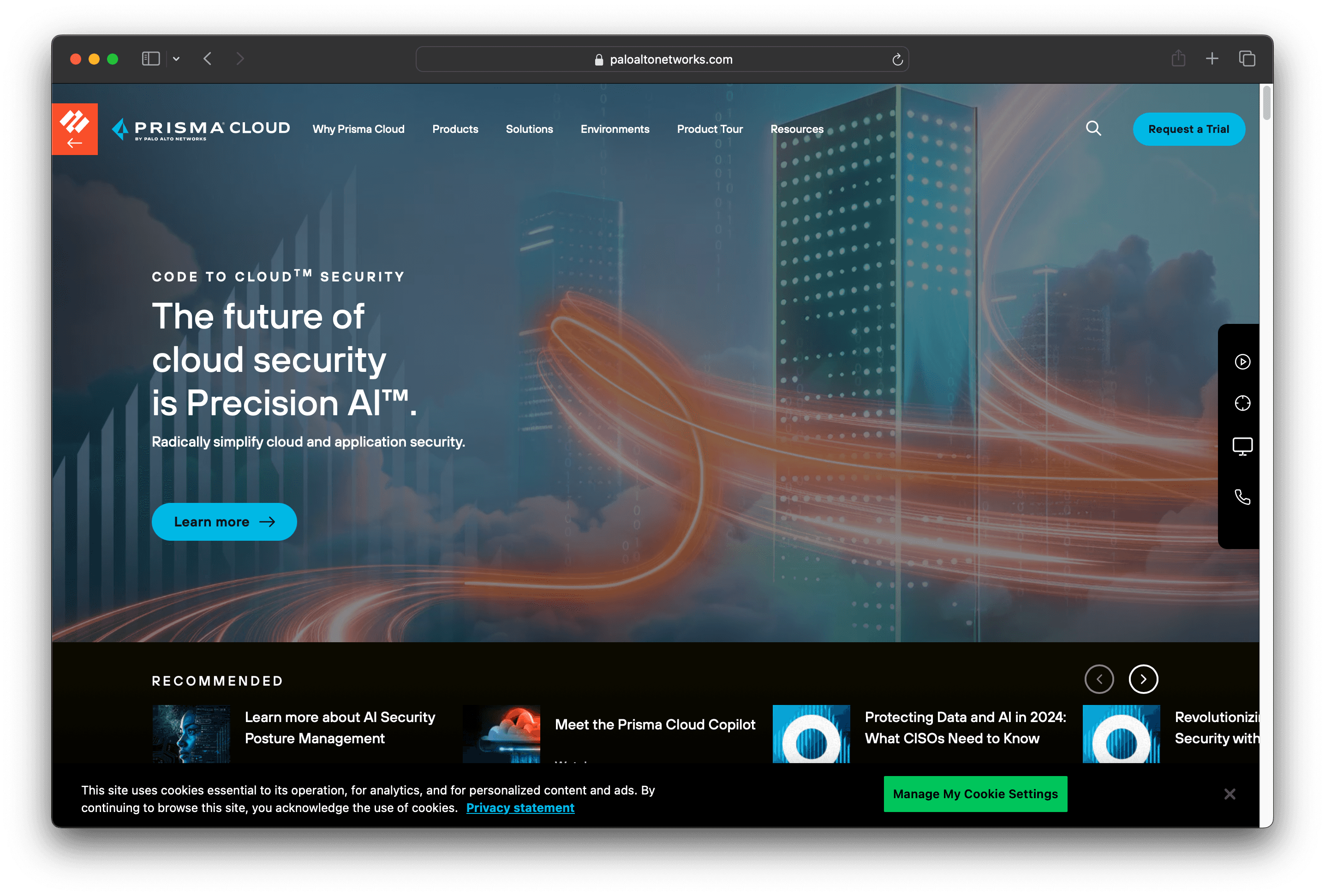
Prisma Cloud is a cloud security platform designed to protect applications from development to deployment. It offers comprehensive security features, including threat detection, compliance, and vulnerability management, all integrated into a single solution. With AI-driven insights, Prisma Cloud ensures robust protection for multi-cloud environments.
Prisma Cloud Pricing
Prisma Cloud's pricing is not public. Contact their support for more info.
Prisma Cloud Reviews
Prisma Cloud has an overall rating of 3.8 out of 5 stars based on 28 reviews. Users appreciate its comprehensive security features but criticize its complexity and support. Check out more of our reviews here!
Pros and Cons of Prisma Cloud
Pros:
Comprehensive security across the entire application lifecycle, ensuring robust protection from development to deployment.
AI-powered risk prioritization and threat detection, providing real-time insights and proactive defense mechanisms.
High visibility and control over AI-powered applications, enhancing overall security posture and compliance.
Cons:
Complexity of implementation can be challenging for teams without extensive cloud security expertise.
High cost may be prohibitive for smaller organizations, limiting accessibility to advanced features.
Integration with existing tools may require significant effort and expertise, posing a barrier to seamless adoption.
7. Rubrik
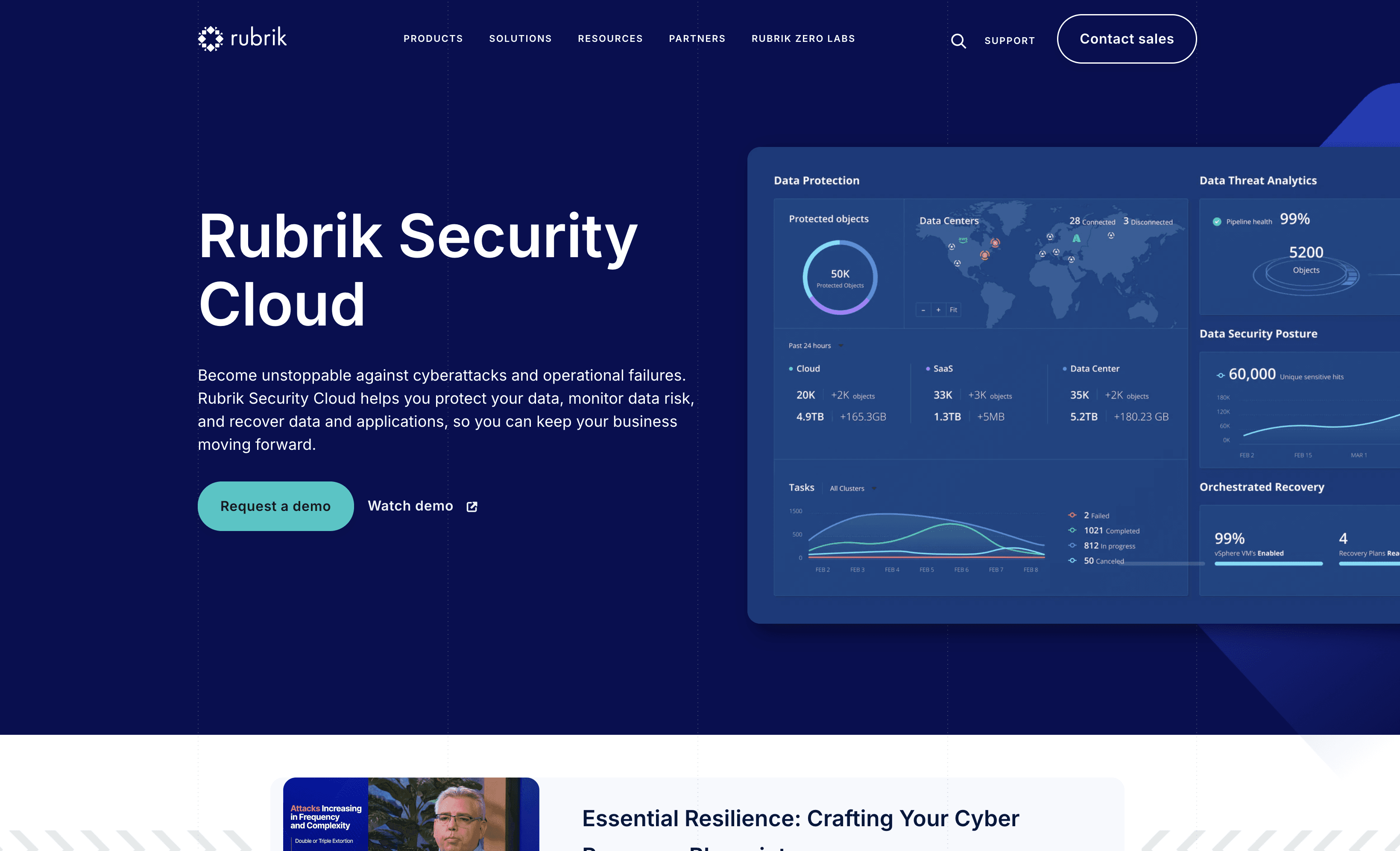
Rubrik is a data security solution designed to protect, monitor, and recover data across enterprise, cloud, and SaaS environments. It offers automated protection, intelligent risk insights, and easy-to-use recovery workflows, ensuring data availability and compliance with minimal manual intervention.
Rubrik Pricing
Rubrik's pricing is not public. Contact their support for more info.
Rubrik Reviews
Rubrik has an overall rating of 4.6 out of 5 stars based on 91 reviews. Users praise its ease of use and excellent customer service. Check out more of our reviews here!
Pros and Cons of Rubrik
Pros:
Ease of Use: Rubrik's intuitive interface simplifies data management, making it accessible even for users with limited technical expertise.
Comprehensive Data Protection: Air-gapped, immutable backups ensure data security against ransomware and insider threats.
Zero Trust Architecture: Built on Zero Trust principles, it offers robust security with features like encryption and multi-factor authentication.
Cons:
Cost: Advanced features and capabilities can be expensive, potentially limiting accessibility for smaller organizations.
Complexity: Managing and implementing Rubrik may require significant expertise and resources, posing a challenge for some teams.
Integration: Integrating Rubrik with existing systems and workflows might require additional effort and customization.
8. Sysdig
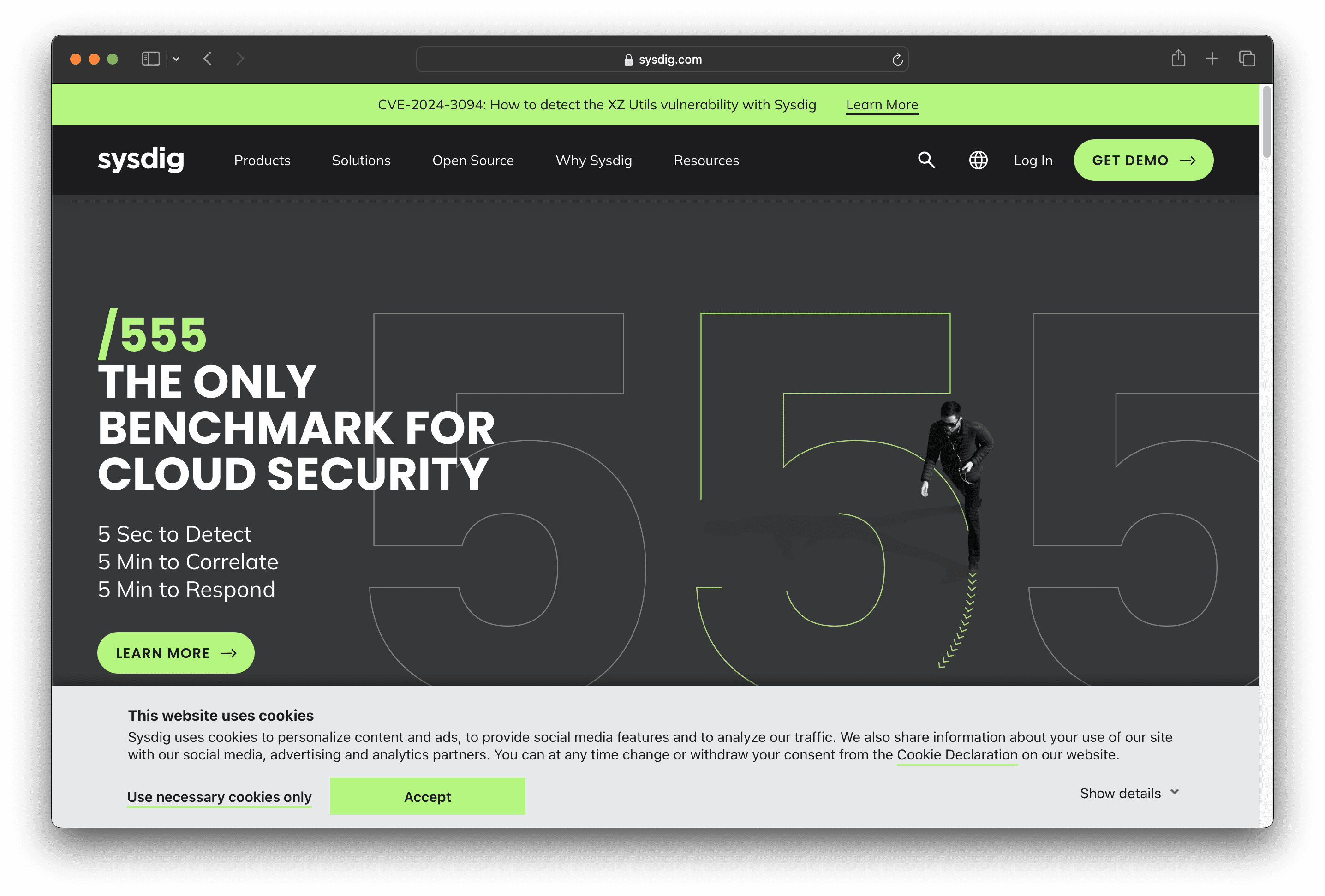
Sysdig is a cloud security platform designed to protect containers, Kubernetes, and cloud environments. It offers real-time alerting, vulnerability management, and cloud detection and response. With an intuitive interface and comprehensive features, Sysdig aims to simplify cloud security for businesses of all sizes.
Sysdig Pricing
Sysdig's pricing is not public. Contact their support for more info.
Sysdig Reviews
Sysdig has an overall rating of 4.8 out of 5 stars based on 77 reviews. Users appreciate its real-time threat detection and comprehensive visibility. Check out more of our reviews here!
Pros and Cons of Sysdig
Pros:
Real-time Alerting: Sysdig offers near real-time alerting, significantly reducing the mean-time-to-detect and respond to threats.
Comprehensive Security Features: The platform combines state-of-the-art security features with an intuitive interface, making it robust yet user-friendly.
Runtime Insights: Prioritization based on runtime insights helps in identifying and addressing the most critical risks efficiently.
Cons:
Complexity: The comprehensive nature of Sysdig might require a steep learning curve for new users, posing a challenge for quick adoption.
Cost: While offering significant benefits, the cost of Sysdig might be a consideration for smaller organizations with limited budgets.
Integration Challenges: Integrating Sysdig with existing systems and workflows might require additional effort and resources, complicating the setup process.
9. Astra Pentest
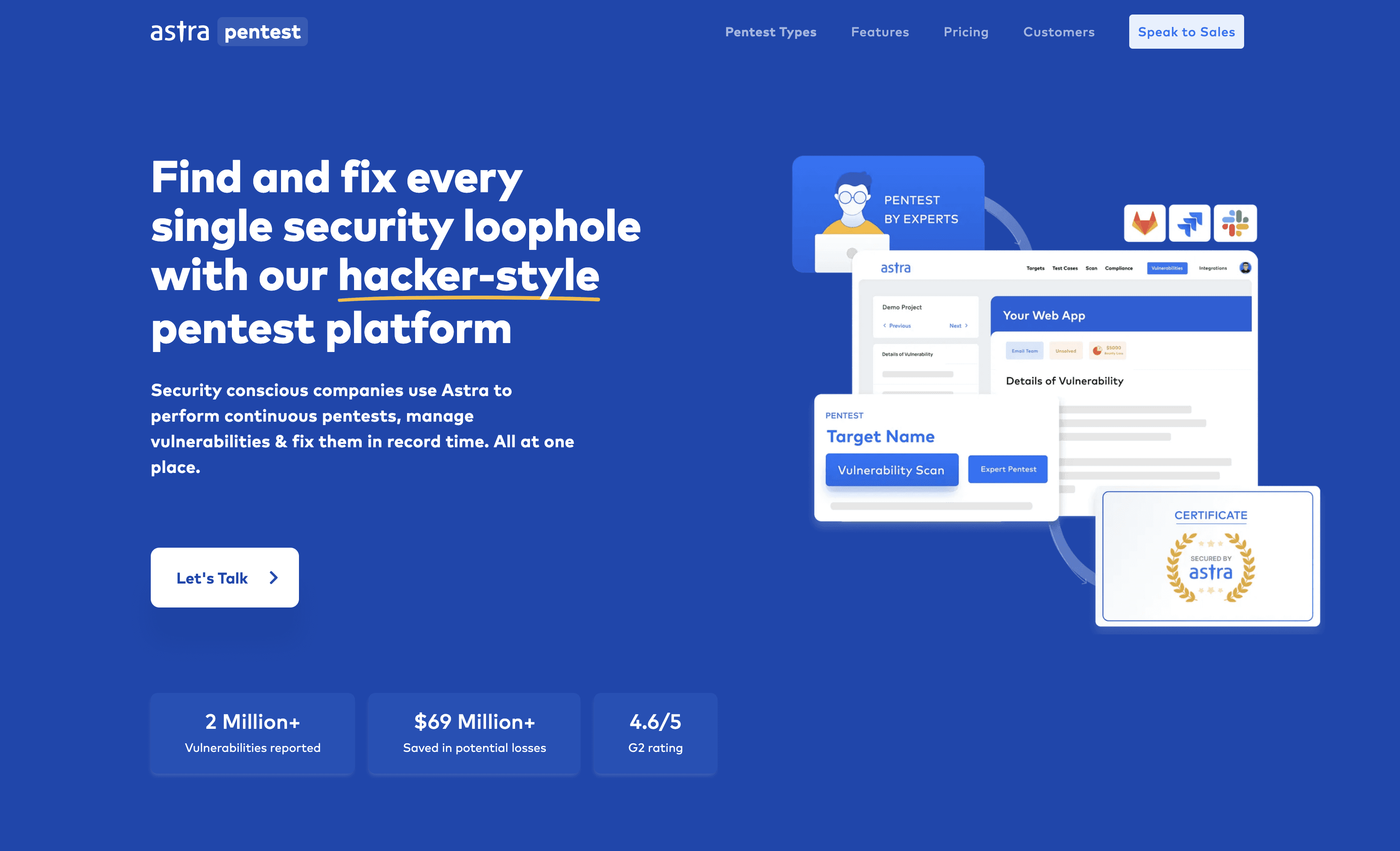
Astra Pentest is a security solution designed to identify and fix vulnerabilities in web applications, mobile apps, and cloud environments. It offers continuous automated scanning and expert-verified reports, ensuring robust protection and compliance. With easy integration and user-friendly features, Astra Pentest simplifies security for businesses of all sizes.
Astra Pentest Pricing
EXPERT: $1,999/yr
SCANNER: $1,999/yr or $199/mo
PENTEST: $5,999/yr
ENTERPRISE: Starting $9,999/yr
SCANNER (Basic): $999/yr
Mobile BASIC: Starts at $699/scan
Mobile PENTEST: $2,499/yr
Mobile ENTERPRISE: $3,999/yr
Cloud BASIC: Starts at $799/scan
Astra Pentest Reviews
Astra Pentest has an overall rating of 4.6 out of 5 stars based on 94 reviews. Users appreciate its comprehensive scope and excellent support. Check out more of our reviews here!
Pros and Cons of Astra Pentest
Pros:
Comprehensive Vulnerability Detection: Astra Pentest excels in identifying a wide range of vulnerabilities, ensuring robust protection for web applications and cloud environments.
Ease of Use: The platform's intuitive interface simplifies the penetration testing process, making it accessible even for users with limited technical expertise.
Excellent Customer Support: Users consistently praise Astra Pentest's responsive and helpful customer support, enhancing the overall user experience.
Cons:
False Positives: Some users report occasional false positives, which can lead to unnecessary remediation efforts and resource allocation.
Performance Issues: A few users have experienced slow performance during scans, potentially delaying the identification of critical vulnerabilities.
Technical Challenges: Integrating Astra Pentest with existing systems and workflows may require additional effort and expertise, complicating the setup process.
10. Lacework
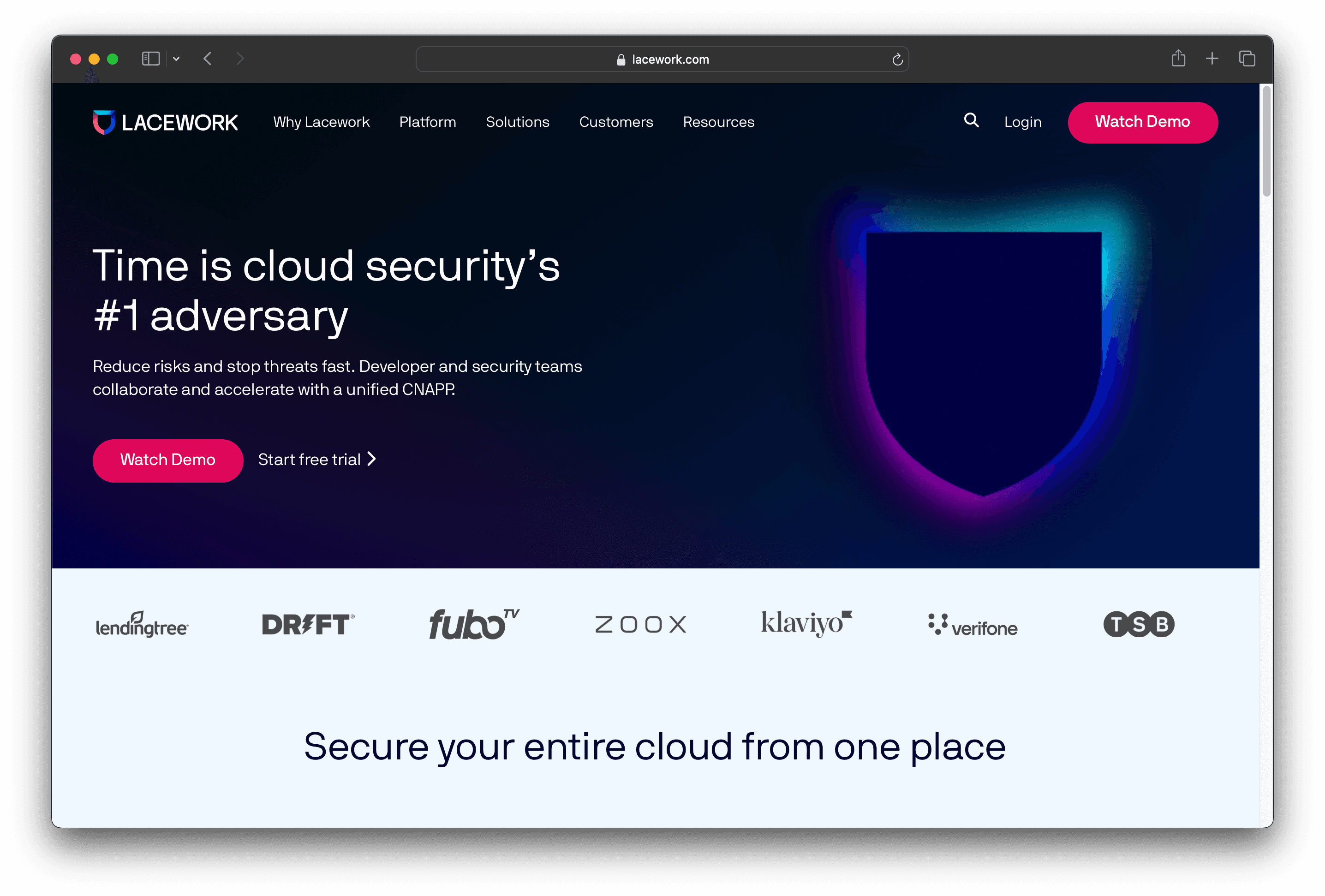
Lacework is a cloud security platform designed to protect DevOps, containers, and cloud environments. It offers multi-cloud visibility and protection through an AI-driven platform, ensuring robust security and compliance. With easy integration and automated processes, Lacework simplifies security management for businesses of all sizes.
Lacework Pricing
Lacework's pricing is not public. Contact their support for more info.
Lacework Reviews
Lacework has an overall rating of 4.4 out of 5 stars based on 377 reviews. Users appreciate its comprehensive security features and ease of use. Check out more of our reviews here!
Pros and Cons of Lacework
Pros:
Unified Security: Lacework provides comprehensive security from code to cloud, ensuring robust protection across all stages of development and deployment.
AI-Driven Insights: Utilizes AI to detect and respond to threats, enhancing overall security measures and reducing manual intervention.
Multi-Cloud Visibility: Offers unmatched visibility and protection across multiple cloud environments, simplifying security management for diverse infrastructures.
Cons:
Complexity: The platform's comprehensive nature might require a steep learning curve, posing challenges for quick adoption.
Cost: Advanced features and AI-driven capabilities can be expensive, potentially limiting accessibility for smaller organizations.
Integration Challenges: Integrating Lacework with existing systems and workflows might require additional effort and resources, complicating the setup process.
Looking to secure your technical infrastructure?
Twingate offers granular access controls and deployment automations to protect your VPC environment. By leveraging Zero Trust security tools, Twingate ensures that private resources and internet traffic remain secure in the modern work landscape. Try Twingate for Free today!
Rapidly implement a modern Zero Trust network that is more secure and maintainable than VPNs.
The Best 10 Alternatives to Illumio (+ Pricing & Reviews)
Twingate Team
•
Jul 27, 2024

Illumio specializes in Zero Trust Segmentation to contain breaches and prevent ransomware from spreading across hybrid attack surfaces. While Illumio offers robust solutions, it might not be the choice for everyone. This article explores the benefits and considerations of using Illumio for cybersecurity.

10 Alternatives to Illumio
1. CrowdStrike Falcon

CrowdStrike Falcon is an endpoint security solution designed to stop breaches with AI-powered protection, detection, and response. It offers comprehensive coverage for various operating systems and integrates advanced threat intelligence to detect and block malicious behaviors early in the kill chain. Falcon is known for its ease of deployment and user-friendly interface.
CrowdStrike Falcon Pricing
Falcon Pro: $99.99/device per year
Falcon Enterprise: $184.99/device per year
Falcon Elite: Contact sales for pricing
Falcon Go: $59.99/device per year
CrowdStrike Falcon Reviews
CrowdStrike Falcon has an overall rating of 4.7 out of 5 stars based on 278 reviews. Users praise its ease of use and excellent customer support. Check out more of our reviews here!
Pros and Cons of CrowdStrike Falcon
Pros:
AI-powered protection ensures real-time threat detection and response, minimizing the risk of breaches.
Comprehensive coverage across various operating systems, including legacy systems, ensures no endpoint is left unprotected.
Unified visibility across cloud, endpoints, and identities helps detect and prevent cross-domain attacks effectively.
Cons:
The platform's advanced features can be complex, requiring a steep learning curve for new users.
High cost may be prohibitive for smaller organizations, making it less accessible to all.
Resource-intensive nature of the platform may require significant infrastructure for optimal performance.
2. UnderDefense

UnderDefense is a comprehensive cybersecurity platform offering 24/7 Managed Detection and Response (MDR), threat response automation, and security tools orchestration. Designed for ease of use and scalability, it helps businesses automate security operations, allowing teams to focus on critical tasks while ensuring robust protection.
UnderDefense Pricing
UnderDefense's pricing is not public. Contact their support for more info.
UnderDefense Reviews
UnderDefense has an overall rating of 5.0 out of 5 stars based on 4 reviews. Users praise its tailored approach and professional support. Check out more of our reviews here!
Pros and Cons ofUnderDefense
Pros:
24/7 live chat with SOC experts ensures immediate support and guidance, enhancing security response times.
Threat response automation reduces manual intervention, allowing security teams to focus on critical tasks.
Seamless integration with existing security tools minimizes disruption and leverages current investments.
Cons:
Some users find the recommendations in reports too general, requiring extra effort to implement.
High cost may be prohibitive for smaller organizations, limiting accessibility.
Users suggest more frequent updates during penetration tests to stay ahead of emerging threats.
3. Barracuda CloudGen Firewall

Barracuda CloudGen Firewall is a network security solution designed to protect against a wide range of threats, including zero-day attacks and ransomware. It offers advanced threat protection, built-in SD-WAN capabilities, and seamless cloud integration, making it a versatile choice for businesses seeking robust and scalable security.
Barracuda CloudGen Firewall Pricing
Barracuda CloudGen Firewall's pricing is not public. Contact their support for more info.
Barracuda CloudGen Firewall Reviews
Barracuda CloudGen Firewall has an overall rating of 4.5 out of 5 stars based on 42 reviews. Users appreciate its ease of use and reliable SSL VPN feature. Check out more of our reviews here!
Pros and Cons of Barracuda CloudGen Firewall
Pros:
Comprehensive Protection: Offers robust security for both on-premises and multi-cloud environments, ensuring all assets are protected.
Ease of Deployment: Automated deployment and configuration make it simple to set up, especially in cloud environments.
Centralized Management: The Barracuda Firewall Control Center allows for streamlined management from a single interface.
Cons:
Complexity: Advanced features and multi-layered security can be challenging for new users to master.
Resource Intensive: Full-emulation sandboxing for threat detection may require significant system resources.
Cost: High-end features and capabilities might be expensive, potentially limiting accessibility for smaller organizations.
4. Orca Security

Orca Security is a cloud security platform offering agentless deployment and comprehensive coverage for multi-cloud environments. It leverages AI-driven insights to detect vulnerabilities and ensure compliance, making it easy to secure cloud-native applications and infrastructure without manual updates or complex integrations.
Orca Security Pricing
Orca Security's pricing is not public. Contact their support for more info.
Orca Security Reviews
Orca Security has an overall rating of 4.6 out of 5 stars based on 167 reviews. Users appreciate its comprehensive visibility and excellent support. Check out more of our reviews here!
Pros and Cons of Orca Security
Pros:
Agentless Cloud Security: Orca's patented SideScanning technology eliminates the need for agents, reducing gaps in coverage and operational costs.
Easy Onboarding: Quick and efficient onboarding process that automatically detects and monitors new cloud assets.
Comprehensive Coverage: Full-stack visibility and coverage for all cloud assets, including VMs, containers, storage buckets, databases, and serverless applications.
Cons:
Complexity for Small Teams: The comprehensive nature of the platform might be overwhelming for smaller teams or organizations with limited security expertise.
Cost: Advanced security solutions like Orca Security can be expensive, which might be a barrier for smaller organizations or startups.
Learning Curve: Integrating and fully utilizing all features of a robust platform like Orca Security may require significant time and training.
5. Tenable

Tenable is a cybersecurity platform specializing in exposure management and vulnerability assessment. It offers comprehensive solutions to identify, assess, and manage security risks across various environments. Designed for ease of use and scalability, Tenable helps organizations maintain robust security postures with minimal manual intervention.
Tenable Pricing
Tenable Nessus Professional: 1 year - $3,990
Tenable Nessus Professional: 2 years - $7,780.50
Tenable Nessus Professional: 3 years - $11,371.50
Advanced support: $400
Nessus Fundamentals training: $275
Tenable Reviews
Tenable has an overall rating of 4.5 out of 5 stars based on 109 reviews. Users praise its intuitive interface and comprehensive asset discovery. Check out more of our reviews here!
Pros and Cons of Tenable
Pros:
Comprehensive Security Solutions: Tenable offers a wide range of products covering cloud security, vulnerability management, and identity exposure.
Unified Platform: Tenable One provides a single platform for managing security visibility, insights, and actions across the entire attack surface.
Advanced Features: Features like ExposureAI and Attack Path Analysis offer sophisticated capabilities for identifying and mitigating risks.
Cons:
Complexity: The extensive range of products and features can be overwhelming for users new to cybersecurity.
Integration Challenges: Integrating Tenable's solutions with existing tools may require significant effort and expertise.
Cost: Advanced features and comprehensive solutions might be expensive, posing a barrier for smaller organizations.
6. Prisma Cloud

Prisma Cloud is a cloud security platform designed to protect applications from development to deployment. It offers comprehensive security features, including threat detection, compliance, and vulnerability management, all integrated into a single solution. With AI-driven insights, Prisma Cloud ensures robust protection for multi-cloud environments.
Prisma Cloud Pricing
Prisma Cloud's pricing is not public. Contact their support for more info.
Prisma Cloud Reviews
Prisma Cloud has an overall rating of 3.8 out of 5 stars based on 28 reviews. Users appreciate its comprehensive security features but criticize its complexity and support. Check out more of our reviews here!
Pros and Cons of Prisma Cloud
Pros:
Comprehensive security across the entire application lifecycle, ensuring robust protection from development to deployment.
AI-powered risk prioritization and threat detection, providing real-time insights and proactive defense mechanisms.
High visibility and control over AI-powered applications, enhancing overall security posture and compliance.
Cons:
Complexity of implementation can be challenging for teams without extensive cloud security expertise.
High cost may be prohibitive for smaller organizations, limiting accessibility to advanced features.
Integration with existing tools may require significant effort and expertise, posing a barrier to seamless adoption.
7. Rubrik

Rubrik is a data security solution designed to protect, monitor, and recover data across enterprise, cloud, and SaaS environments. It offers automated protection, intelligent risk insights, and easy-to-use recovery workflows, ensuring data availability and compliance with minimal manual intervention.
Rubrik Pricing
Rubrik's pricing is not public. Contact their support for more info.
Rubrik Reviews
Rubrik has an overall rating of 4.6 out of 5 stars based on 91 reviews. Users praise its ease of use and excellent customer service. Check out more of our reviews here!
Pros and Cons of Rubrik
Pros:
Ease of Use: Rubrik's intuitive interface simplifies data management, making it accessible even for users with limited technical expertise.
Comprehensive Data Protection: Air-gapped, immutable backups ensure data security against ransomware and insider threats.
Zero Trust Architecture: Built on Zero Trust principles, it offers robust security with features like encryption and multi-factor authentication.
Cons:
Cost: Advanced features and capabilities can be expensive, potentially limiting accessibility for smaller organizations.
Complexity: Managing and implementing Rubrik may require significant expertise and resources, posing a challenge for some teams.
Integration: Integrating Rubrik with existing systems and workflows might require additional effort and customization.
8. Sysdig

Sysdig is a cloud security platform designed to protect containers, Kubernetes, and cloud environments. It offers real-time alerting, vulnerability management, and cloud detection and response. With an intuitive interface and comprehensive features, Sysdig aims to simplify cloud security for businesses of all sizes.
Sysdig Pricing
Sysdig's pricing is not public. Contact their support for more info.
Sysdig Reviews
Sysdig has an overall rating of 4.8 out of 5 stars based on 77 reviews. Users appreciate its real-time threat detection and comprehensive visibility. Check out more of our reviews here!
Pros and Cons of Sysdig
Pros:
Real-time Alerting: Sysdig offers near real-time alerting, significantly reducing the mean-time-to-detect and respond to threats.
Comprehensive Security Features: The platform combines state-of-the-art security features with an intuitive interface, making it robust yet user-friendly.
Runtime Insights: Prioritization based on runtime insights helps in identifying and addressing the most critical risks efficiently.
Cons:
Complexity: The comprehensive nature of Sysdig might require a steep learning curve for new users, posing a challenge for quick adoption.
Cost: While offering significant benefits, the cost of Sysdig might be a consideration for smaller organizations with limited budgets.
Integration Challenges: Integrating Sysdig with existing systems and workflows might require additional effort and resources, complicating the setup process.
9. Astra Pentest

Astra Pentest is a security solution designed to identify and fix vulnerabilities in web applications, mobile apps, and cloud environments. It offers continuous automated scanning and expert-verified reports, ensuring robust protection and compliance. With easy integration and user-friendly features, Astra Pentest simplifies security for businesses of all sizes.
Astra Pentest Pricing
EXPERT: $1,999/yr
SCANNER: $1,999/yr or $199/mo
PENTEST: $5,999/yr
ENTERPRISE: Starting $9,999/yr
SCANNER (Basic): $999/yr
Mobile BASIC: Starts at $699/scan
Mobile PENTEST: $2,499/yr
Mobile ENTERPRISE: $3,999/yr
Cloud BASIC: Starts at $799/scan
Astra Pentest Reviews
Astra Pentest has an overall rating of 4.6 out of 5 stars based on 94 reviews. Users appreciate its comprehensive scope and excellent support. Check out more of our reviews here!
Pros and Cons of Astra Pentest
Pros:
Comprehensive Vulnerability Detection: Astra Pentest excels in identifying a wide range of vulnerabilities, ensuring robust protection for web applications and cloud environments.
Ease of Use: The platform's intuitive interface simplifies the penetration testing process, making it accessible even for users with limited technical expertise.
Excellent Customer Support: Users consistently praise Astra Pentest's responsive and helpful customer support, enhancing the overall user experience.
Cons:
False Positives: Some users report occasional false positives, which can lead to unnecessary remediation efforts and resource allocation.
Performance Issues: A few users have experienced slow performance during scans, potentially delaying the identification of critical vulnerabilities.
Technical Challenges: Integrating Astra Pentest with existing systems and workflows may require additional effort and expertise, complicating the setup process.
10. Lacework

Lacework is a cloud security platform designed to protect DevOps, containers, and cloud environments. It offers multi-cloud visibility and protection through an AI-driven platform, ensuring robust security and compliance. With easy integration and automated processes, Lacework simplifies security management for businesses of all sizes.
Lacework Pricing
Lacework's pricing is not public. Contact their support for more info.
Lacework Reviews
Lacework has an overall rating of 4.4 out of 5 stars based on 377 reviews. Users appreciate its comprehensive security features and ease of use. Check out more of our reviews here!
Pros and Cons of Lacework
Pros:
Unified Security: Lacework provides comprehensive security from code to cloud, ensuring robust protection across all stages of development and deployment.
AI-Driven Insights: Utilizes AI to detect and respond to threats, enhancing overall security measures and reducing manual intervention.
Multi-Cloud Visibility: Offers unmatched visibility and protection across multiple cloud environments, simplifying security management for diverse infrastructures.
Cons:
Complexity: The platform's comprehensive nature might require a steep learning curve, posing challenges for quick adoption.
Cost: Advanced features and AI-driven capabilities can be expensive, potentially limiting accessibility for smaller organizations.
Integration Challenges: Integrating Lacework with existing systems and workflows might require additional effort and resources, complicating the setup process.
Looking to secure your technical infrastructure?
Twingate offers granular access controls and deployment automations to protect your VPC environment. By leveraging Zero Trust security tools, Twingate ensures that private resources and internet traffic remain secure in the modern work landscape. Try Twingate for Free today!
Rapidly implement a modern Zero Trust network that is more secure and maintainable than VPNs.
The Best 10 Alternatives to Illumio (+ Pricing & Reviews)
Twingate Team
•
Jul 27, 2024

Illumio specializes in Zero Trust Segmentation to contain breaches and prevent ransomware from spreading across hybrid attack surfaces. While Illumio offers robust solutions, it might not be the choice for everyone. This article explores the benefits and considerations of using Illumio for cybersecurity.

10 Alternatives to Illumio
1. CrowdStrike Falcon

CrowdStrike Falcon is an endpoint security solution designed to stop breaches with AI-powered protection, detection, and response. It offers comprehensive coverage for various operating systems and integrates advanced threat intelligence to detect and block malicious behaviors early in the kill chain. Falcon is known for its ease of deployment and user-friendly interface.
CrowdStrike Falcon Pricing
Falcon Pro: $99.99/device per year
Falcon Enterprise: $184.99/device per year
Falcon Elite: Contact sales for pricing
Falcon Go: $59.99/device per year
CrowdStrike Falcon Reviews
CrowdStrike Falcon has an overall rating of 4.7 out of 5 stars based on 278 reviews. Users praise its ease of use and excellent customer support. Check out more of our reviews here!
Pros and Cons of CrowdStrike Falcon
Pros:
AI-powered protection ensures real-time threat detection and response, minimizing the risk of breaches.
Comprehensive coverage across various operating systems, including legacy systems, ensures no endpoint is left unprotected.
Unified visibility across cloud, endpoints, and identities helps detect and prevent cross-domain attacks effectively.
Cons:
The platform's advanced features can be complex, requiring a steep learning curve for new users.
High cost may be prohibitive for smaller organizations, making it less accessible to all.
Resource-intensive nature of the platform may require significant infrastructure for optimal performance.
2. UnderDefense

UnderDefense is a comprehensive cybersecurity platform offering 24/7 Managed Detection and Response (MDR), threat response automation, and security tools orchestration. Designed for ease of use and scalability, it helps businesses automate security operations, allowing teams to focus on critical tasks while ensuring robust protection.
UnderDefense Pricing
UnderDefense's pricing is not public. Contact their support for more info.
UnderDefense Reviews
UnderDefense has an overall rating of 5.0 out of 5 stars based on 4 reviews. Users praise its tailored approach and professional support. Check out more of our reviews here!
Pros and Cons ofUnderDefense
Pros:
24/7 live chat with SOC experts ensures immediate support and guidance, enhancing security response times.
Threat response automation reduces manual intervention, allowing security teams to focus on critical tasks.
Seamless integration with existing security tools minimizes disruption and leverages current investments.
Cons:
Some users find the recommendations in reports too general, requiring extra effort to implement.
High cost may be prohibitive for smaller organizations, limiting accessibility.
Users suggest more frequent updates during penetration tests to stay ahead of emerging threats.
3. Barracuda CloudGen Firewall

Barracuda CloudGen Firewall is a network security solution designed to protect against a wide range of threats, including zero-day attacks and ransomware. It offers advanced threat protection, built-in SD-WAN capabilities, and seamless cloud integration, making it a versatile choice for businesses seeking robust and scalable security.
Barracuda CloudGen Firewall Pricing
Barracuda CloudGen Firewall's pricing is not public. Contact their support for more info.
Barracuda CloudGen Firewall Reviews
Barracuda CloudGen Firewall has an overall rating of 4.5 out of 5 stars based on 42 reviews. Users appreciate its ease of use and reliable SSL VPN feature. Check out more of our reviews here!
Pros and Cons of Barracuda CloudGen Firewall
Pros:
Comprehensive Protection: Offers robust security for both on-premises and multi-cloud environments, ensuring all assets are protected.
Ease of Deployment: Automated deployment and configuration make it simple to set up, especially in cloud environments.
Centralized Management: The Barracuda Firewall Control Center allows for streamlined management from a single interface.
Cons:
Complexity: Advanced features and multi-layered security can be challenging for new users to master.
Resource Intensive: Full-emulation sandboxing for threat detection may require significant system resources.
Cost: High-end features and capabilities might be expensive, potentially limiting accessibility for smaller organizations.
4. Orca Security

Orca Security is a cloud security platform offering agentless deployment and comprehensive coverage for multi-cloud environments. It leverages AI-driven insights to detect vulnerabilities and ensure compliance, making it easy to secure cloud-native applications and infrastructure without manual updates or complex integrations.
Orca Security Pricing
Orca Security's pricing is not public. Contact their support for more info.
Orca Security Reviews
Orca Security has an overall rating of 4.6 out of 5 stars based on 167 reviews. Users appreciate its comprehensive visibility and excellent support. Check out more of our reviews here!
Pros and Cons of Orca Security
Pros:
Agentless Cloud Security: Orca's patented SideScanning technology eliminates the need for agents, reducing gaps in coverage and operational costs.
Easy Onboarding: Quick and efficient onboarding process that automatically detects and monitors new cloud assets.
Comprehensive Coverage: Full-stack visibility and coverage for all cloud assets, including VMs, containers, storage buckets, databases, and serverless applications.
Cons:
Complexity for Small Teams: The comprehensive nature of the platform might be overwhelming for smaller teams or organizations with limited security expertise.
Cost: Advanced security solutions like Orca Security can be expensive, which might be a barrier for smaller organizations or startups.
Learning Curve: Integrating and fully utilizing all features of a robust platform like Orca Security may require significant time and training.
5. Tenable

Tenable is a cybersecurity platform specializing in exposure management and vulnerability assessment. It offers comprehensive solutions to identify, assess, and manage security risks across various environments. Designed for ease of use and scalability, Tenable helps organizations maintain robust security postures with minimal manual intervention.
Tenable Pricing
Tenable Nessus Professional: 1 year - $3,990
Tenable Nessus Professional: 2 years - $7,780.50
Tenable Nessus Professional: 3 years - $11,371.50
Advanced support: $400
Nessus Fundamentals training: $275
Tenable Reviews
Tenable has an overall rating of 4.5 out of 5 stars based on 109 reviews. Users praise its intuitive interface and comprehensive asset discovery. Check out more of our reviews here!
Pros and Cons of Tenable
Pros:
Comprehensive Security Solutions: Tenable offers a wide range of products covering cloud security, vulnerability management, and identity exposure.
Unified Platform: Tenable One provides a single platform for managing security visibility, insights, and actions across the entire attack surface.
Advanced Features: Features like ExposureAI and Attack Path Analysis offer sophisticated capabilities for identifying and mitigating risks.
Cons:
Complexity: The extensive range of products and features can be overwhelming for users new to cybersecurity.
Integration Challenges: Integrating Tenable's solutions with existing tools may require significant effort and expertise.
Cost: Advanced features and comprehensive solutions might be expensive, posing a barrier for smaller organizations.
6. Prisma Cloud

Prisma Cloud is a cloud security platform designed to protect applications from development to deployment. It offers comprehensive security features, including threat detection, compliance, and vulnerability management, all integrated into a single solution. With AI-driven insights, Prisma Cloud ensures robust protection for multi-cloud environments.
Prisma Cloud Pricing
Prisma Cloud's pricing is not public. Contact their support for more info.
Prisma Cloud Reviews
Prisma Cloud has an overall rating of 3.8 out of 5 stars based on 28 reviews. Users appreciate its comprehensive security features but criticize its complexity and support. Check out more of our reviews here!
Pros and Cons of Prisma Cloud
Pros:
Comprehensive security across the entire application lifecycle, ensuring robust protection from development to deployment.
AI-powered risk prioritization and threat detection, providing real-time insights and proactive defense mechanisms.
High visibility and control over AI-powered applications, enhancing overall security posture and compliance.
Cons:
Complexity of implementation can be challenging for teams without extensive cloud security expertise.
High cost may be prohibitive for smaller organizations, limiting accessibility to advanced features.
Integration with existing tools may require significant effort and expertise, posing a barrier to seamless adoption.
7. Rubrik

Rubrik is a data security solution designed to protect, monitor, and recover data across enterprise, cloud, and SaaS environments. It offers automated protection, intelligent risk insights, and easy-to-use recovery workflows, ensuring data availability and compliance with minimal manual intervention.
Rubrik Pricing
Rubrik's pricing is not public. Contact their support for more info.
Rubrik Reviews
Rubrik has an overall rating of 4.6 out of 5 stars based on 91 reviews. Users praise its ease of use and excellent customer service. Check out more of our reviews here!
Pros and Cons of Rubrik
Pros:
Ease of Use: Rubrik's intuitive interface simplifies data management, making it accessible even for users with limited technical expertise.
Comprehensive Data Protection: Air-gapped, immutable backups ensure data security against ransomware and insider threats.
Zero Trust Architecture: Built on Zero Trust principles, it offers robust security with features like encryption and multi-factor authentication.
Cons:
Cost: Advanced features and capabilities can be expensive, potentially limiting accessibility for smaller organizations.
Complexity: Managing and implementing Rubrik may require significant expertise and resources, posing a challenge for some teams.
Integration: Integrating Rubrik with existing systems and workflows might require additional effort and customization.
8. Sysdig

Sysdig is a cloud security platform designed to protect containers, Kubernetes, and cloud environments. It offers real-time alerting, vulnerability management, and cloud detection and response. With an intuitive interface and comprehensive features, Sysdig aims to simplify cloud security for businesses of all sizes.
Sysdig Pricing
Sysdig's pricing is not public. Contact their support for more info.
Sysdig Reviews
Sysdig has an overall rating of 4.8 out of 5 stars based on 77 reviews. Users appreciate its real-time threat detection and comprehensive visibility. Check out more of our reviews here!
Pros and Cons of Sysdig
Pros:
Real-time Alerting: Sysdig offers near real-time alerting, significantly reducing the mean-time-to-detect and respond to threats.
Comprehensive Security Features: The platform combines state-of-the-art security features with an intuitive interface, making it robust yet user-friendly.
Runtime Insights: Prioritization based on runtime insights helps in identifying and addressing the most critical risks efficiently.
Cons:
Complexity: The comprehensive nature of Sysdig might require a steep learning curve for new users, posing a challenge for quick adoption.
Cost: While offering significant benefits, the cost of Sysdig might be a consideration for smaller organizations with limited budgets.
Integration Challenges: Integrating Sysdig with existing systems and workflows might require additional effort and resources, complicating the setup process.
9. Astra Pentest

Astra Pentest is a security solution designed to identify and fix vulnerabilities in web applications, mobile apps, and cloud environments. It offers continuous automated scanning and expert-verified reports, ensuring robust protection and compliance. With easy integration and user-friendly features, Astra Pentest simplifies security for businesses of all sizes.
Astra Pentest Pricing
EXPERT: $1,999/yr
SCANNER: $1,999/yr or $199/mo
PENTEST: $5,999/yr
ENTERPRISE: Starting $9,999/yr
SCANNER (Basic): $999/yr
Mobile BASIC: Starts at $699/scan
Mobile PENTEST: $2,499/yr
Mobile ENTERPRISE: $3,999/yr
Cloud BASIC: Starts at $799/scan
Astra Pentest Reviews
Astra Pentest has an overall rating of 4.6 out of 5 stars based on 94 reviews. Users appreciate its comprehensive scope and excellent support. Check out more of our reviews here!
Pros and Cons of Astra Pentest
Pros:
Comprehensive Vulnerability Detection: Astra Pentest excels in identifying a wide range of vulnerabilities, ensuring robust protection for web applications and cloud environments.
Ease of Use: The platform's intuitive interface simplifies the penetration testing process, making it accessible even for users with limited technical expertise.
Excellent Customer Support: Users consistently praise Astra Pentest's responsive and helpful customer support, enhancing the overall user experience.
Cons:
False Positives: Some users report occasional false positives, which can lead to unnecessary remediation efforts and resource allocation.
Performance Issues: A few users have experienced slow performance during scans, potentially delaying the identification of critical vulnerabilities.
Technical Challenges: Integrating Astra Pentest with existing systems and workflows may require additional effort and expertise, complicating the setup process.
10. Lacework

Lacework is a cloud security platform designed to protect DevOps, containers, and cloud environments. It offers multi-cloud visibility and protection through an AI-driven platform, ensuring robust security and compliance. With easy integration and automated processes, Lacework simplifies security management for businesses of all sizes.
Lacework Pricing
Lacework's pricing is not public. Contact their support for more info.
Lacework Reviews
Lacework has an overall rating of 4.4 out of 5 stars based on 377 reviews. Users appreciate its comprehensive security features and ease of use. Check out more of our reviews here!
Pros and Cons of Lacework
Pros:
Unified Security: Lacework provides comprehensive security from code to cloud, ensuring robust protection across all stages of development and deployment.
AI-Driven Insights: Utilizes AI to detect and respond to threats, enhancing overall security measures and reducing manual intervention.
Multi-Cloud Visibility: Offers unmatched visibility and protection across multiple cloud environments, simplifying security management for diverse infrastructures.
Cons:
Complexity: The platform's comprehensive nature might require a steep learning curve, posing challenges for quick adoption.
Cost: Advanced features and AI-driven capabilities can be expensive, potentially limiting accessibility for smaller organizations.
Integration Challenges: Integrating Lacework with existing systems and workflows might require additional effort and resources, complicating the setup process.
Looking to secure your technical infrastructure?
Twingate offers granular access controls and deployment automations to protect your VPC environment. By leveraging Zero Trust security tools, Twingate ensures that private resources and internet traffic remain secure in the modern work landscape. Try Twingate for Free today!
Solutions
Solutions
The VPN replacement your workforce will love.
Solutions